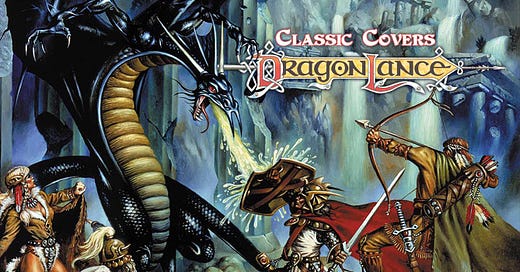Somewhere along the way, gamers developed this idea that RPGs are all about the story. This may be due to the rise of in-universe fiction released by TSR in the 80’s and 90’s with Dragonlance in particular being seen as the flashpoint for story-driven RPGs. It could also be due to the prevalence of story-heavy video games serving as many gamers’ introduction to role-playing. Then again, it could simply be down to younger players hearing older players tell stories about what happened in their campaigns and thinking that it was by design. Regardless of how the trend started, the prevailing “wisdom” now is that RPGs require a plot or story to spur the players on to action. As I said briefly in the previous article, this emphasis on story undercuts the game in many ways. Today we're gonna talk about it in-depth.
First we should ask the question of whether or not story belongs in gaming. It may surprise you, but I do believe that story is essential to RPGs. However, story in RPGs isn't plot like a novel or a movie. Instead, it's made up of two elements. The first is lore, which provides curious players with the context for why the world is the way that it is. Most of this lore will be hidden but discoverable to the curious player. It's the kind of information that can be placed in dungeons and puzzled together to gain insights. It's equal parts story and game element. Some of it players will never see, some of it they will search for on many adventures. It just depends on what's relevant to their goals.
The second story element is emergent story. This is story that is constructed post hoc and basically serves as a record of the deeds of the players. The thing that differentiates emergent story from plot is that the emergent story shouldn't feel present to the players in the midst of an adventure. A plot is rails that guide the adventure and the players will be aware of it if it's there. The funny thing about emergent story is that it’s largely based on perception. Players may view something that the GM saw as mundane as some kind of great adventure. Stories can be exaggerated over time and what was a normal night at the table could evolve into a grand story of epic fantasy adventure with just a couple years’ distance from the event. This story only exists after the dice are put away though.
The reason why lore and emergent story work is that they are both dependent on player action. Lore must be discovered and that discovery means adventure. Adventure, whether on search of lore or treasure or something else, creates emergent narrative. Plot does not depend on player action. Six different groups exploring the same dungeon could produce 6 different stories as each one does something different. Six different groups playing a story-driven module will all encounter the same things in the same order and likely have to deal with them in the same way. Plot is the antithesis of player agency. It forces players onto a certain path and punishes them for straying. Emergent story relies on the players to make their own decisions and set their own path because it can only exist if they do.
Why is plot an RPG contradiction though? Well, it causes a contradiction when players demand both plot and agency. You cannot have both, so either players have to give up their agency, at least to a certain degree, or they have to make their own story. Unfortunately, modern players seem to demand both. They expect grand, sweeping plots like they see in movies or on Critical Role but they don’t want to be railroaded. The result turns the table into a writers’ room and leaves the GM feeling like he has to have the narrative skills of J.R.R. Tolkein but leave enough room in their grand narrative for the players to feel like they’re driving. Some GMs will turn dictatorial and act like the players are characters in a novel that they are writing who won’t cooperate. It creates an unsustainable dynamic where either the GM or the players will eventually feel trapped and call off the game.
Table-top RPGs cannot have a set story. Plot is for characters without agency who are driven by the whims of an author or the programming of a computer. Characters controlled by independent persons with agency of their own will have to sacrifice their agency to follow a plot or sacrifice a plot to follow their agency. This is why Critical Role is not really a game. Is it scripted? No, probably not, but there’s an understanding among the cast members that they’re following Matt Mercer’s plot. Trying to replicate that dynamic at your table will destroy it. Instead, try lore and emergent story.




